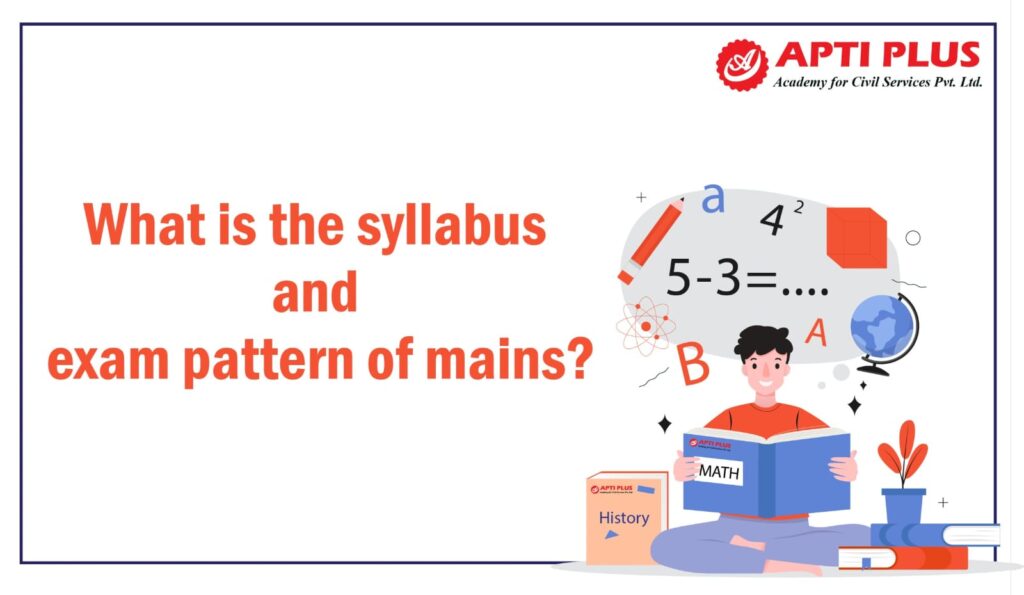UPSC Mains Subject Wise Weightage
| Tables Of Content |
|---|
| UPSC Syllabus Mains Overview |
| UPSC Syllabus for mains |
| UPSC Mains Subject Wise weightage: |
| UPSC Mains Cut-off Marks – Over the Years |
The Union Public Service Commission (UPSC) conducts the Civil Services Examination in three stages: Preliminary, Mains, and Interview. The Mains exam is a written examination that tests the candidates’ knowledge of various subjects, including their analytical ability and writing skills. The exam consists of nine papers, out of which two are qualifying papers and seven are merit-based papers. Whether you’re seeking UPSC coaching in Bhubaneshwar or UPSC coaching in Kolkata, understanding the subject-wise weightage for each paper is crucial, and in this blog, we will discuss the same.
The following is the subject-wise weightage for each paper in the UPSC Mains exam:
- Paper A – Indian Language (Qualifying): The paper tests the candidate’s proficiency in the chosen Indian language. It is a qualifying paper, and the marks obtained in this paper are not counted for the final merit list.
- Paper B – English (Qualifying): The paper tests the candidate’s proficiency in English. It is a qualifying paper, and the marks obtained in this paper are not counted for the final merit list.
- Paper I – Essay: The paper tests the candidate’s ability to express their thoughts in a clear and concise manner. The weightage for this paper is 250 marks.
- Paper II – GS papers I: The paper tests the candidate’s knowledge of Indian Heritage and Culture, History, and Geography of the World and Society. The weightage for this paper is 250 marks.
- Paper III – General studies paper II: The paper tests the candidate’s knowledge of Indian Constitution, Governance, Social Justice, and International Relations. The weightage for this paper is 250 marks.
- Paper IV – GS papers III: The paper tests the candidate’s knowledge of Technology, Economic Development, Biodiversity, Environment, Security, and Disaster Management. The weightage for this paper is 250 marks.
- Paper V – GS papers IV: The paper tests the candidate’s knowledge of Ethics, Integrity, and Aptitude. The weightage for this paper is 250 marks.
- Paper VI – Optional Subject Paper I: The paper tests the candidate’s knowledge of the chosen optional subject. The weightage for this paper is 250 marks.
- Paper VII – Optional Subject Paper II: The paper tests the candidate’s knowledge of the chosen optional subject. The weightage for this paper is 250 marks.
UPSC Syllabus Mains Overview

| UPSC Syllabus Mains 2023 | |
| Name | UPSC Syllabus Mains |
| Exam Date | 15th to 19th September 2023 |
| Number of Papers | Nine |
| Types of Paper | Conventional Papers (Descriptive Type) |
| Duration of Exam | 3 hours Each Paper |
| Total Marks | 1750 |
| Language of Exam | English & Hindi (Except Language Paper) |
| Negative Marking | No negative marking but Penalty Marking for various mistakes done by candidates |
| Marks Counted in Merit | Yes |
UPSC Mains Pattern

| Paper A | Compulsory Indian language | 3 hours | 300 (Qualifying) |
| Paper B | English | 3 hours | 300 (Qualifying) |
| Paper I | Essay | 3 hours | 250 |
| Paper II | General Studies I – Indian Heritage & Culture, History & Geography of the World & Society | 3 hours | 250 |
| Paper III | General Studies paper II – Governance, Constitution, Welfare Initiatives, Social Justice & International Relations | 3 hours | 250 |
| Paper IV | General Studies III – Technology, Economic Development, Agriculture, Biodiversity, Security & Disaster Management | 3 hours | 250 |
| Paper V | General Studies IV – Ethics, Integrity & Aptitude | 3 hours | 250 |
| Paper VI | Optional Subject – Paper I | 3 hours | 250 |
| Paper VII | Optional Subject – Paper II | 3 hours | 250 |
UPSC Syllabus for mains

The UPSC Syllabus for Mains exam is divided into nine papers, which are as follows:
- Paper I: Essay (250 Marks) – Candidates have to write two essays, choosing one topic from each section out of four given options.
- Paper II: General Studies-I (250 Marks) – This paper covers Indian Heritage and Culture, History, and Geography of the World and Society.
- Paper III: General Studies paper II (250 Marks) – This paper covers Governance, Constitution, Polity, Social Justice and International Relations.
- Paper IV: General Studies-III (250 Marks) – This paper covers Technology, Economic Development, Bio-diversity, Environment, Security and Disaster Management.
- Paper V: General Studies-IV (250 Marks) – This paper covers Ethics, Integrity and Aptitude.
- Paper VI and VII: Optional Subject Paper-I and II (250 Marks each) – Candidates have to choose one optional subject and write two papers, one for each.
- Paper VIII and IX: English and Indian Language (300 Marks each) – These are qualifying papers and the marks obtained will not be counted for the final merit list.
The Union Public Commission Mains exam is designed to test the candidate’s knowledge, understanding, and ability to apply the concepts in various subjects. The syllabus of each subject is vast, and candidates need to have a thorough understanding of the concepts. And be able to express their thoughts clearly and coherently in the examination.
UPSC Mains Subject Wise weightage

The rank of a candidate in the Union Public Commission Civil Service Exam depends solely on the marks obtained in the Main and Interview exams. The Main exam carries 1750 marks while the interview carries 275 marks.
The Main exam consists of nine papers, but only seven papers are considered for the final merit ranking. For the remaining two papers, candidates must obtain the minimum marks specified by Union Public Commission each year. The papers containing in the UPSC Mains are as follows:
QUALIFYING PAPERS
The language section of the UPSC Mains exam includes two compulsory papers:
- English Language (300 marks)
- Any Indian Language (300 marks)
Qualifying marks for the Union Public Commission language papers are 25%, which equals to 75 marks for each paper. The syllabus for these papers is straightforward, making it easy to score the minimum cut-off. To prepare for these papers, candidates should follow specific strategies.
- English Language- 300 marks
UPSC Compulsory English language Paper aims to test the candidate’s ability to read and comprehend serious descriptive prose and express ideas clearly and accurately. Understanding the pattern of the English language paper is essential for candidates.
- Short Essay Writing in UPSC Mains
The UPSC Mains exam consists of four general topics from which a candidate is expected to choose one and answer it in 600 words. This essay is intended to test the candidate’s ability to express their thoughts and emotions in English language at a basic level. Regular reading of newspapers will help improve a candidate’s language and writing skills, and the preparation done for the GS papers and Essay papers is sufficient to ace this section.
Tips to Structure Your Essay:
- Introduction
- Body
- Conclusion
Brainstorming the essay’s structure before starting to write will make it look more organized.
- Reading Comprehension Section:
Thoroughly read the passage to understand its essence, theme, and the author’s opinion. Highlighting important points in the first reading itself is advisable. Carefully read the questions and then read the passage again before answering because the passage will contain direct cues to answer the questions.
- Precis Writing:
Compressing an essay of 1000 words into just one-third without losing its essence is the toughest part of the paper. To overcome this challenge, read the given passage carefully and understand the core ideas involved. Then, prepare a rough draft containing all the crucial points. Later, this can be fitted into the boxes given. While filling up the boxes, use them judiciously and avoid wasting them for articles and prepositions. Never deviate from the core idea in the given passage and be conscious of the time constraint.
- Vocabulary Section:
This section contains various one-mark questions that are very simple and of Matriculation or equivalent level. The questions range from correcting a sentence, supplying the missing words, using the correct form of verbs, writing antonyms/synonyms, rewriting the sentence as directed, making sentences as directed, fill in the blanks, and making sentences using phrases. Finishing these questions quickly is advisable since they are not time-consuming in nature.
- Compulsory Indian language paper- 300 Marks

The purpose of UPSC is to evaluate a candidate’s fundamental language proficiency. Including their ability to read, write, and comprehend in the Indian languages that are listed in our constitution’s 8th schedule.
UPSC Allows Indian Languages and Scripts for Civil Services Exam
The following scripts will be utilised by the applicants for the Language medium/literature:
| LANGUAGE | SCRIPT |
| 1. Assamese | Assamese |
| 2. Bengali | Bengali |
| 3. Gujarati | Gujarati |
| 4. Hindi | Devanagari |
| 5. Kannada | Kannada |
| 6. Kashmiri | Persian |
| 7. Konkani | Devanagari |
| 8. Malayalam | Malayalam |
| 9. Manipuri | Bengali |
| 10. Marathi | Devanagari |
| 11. Nepali | Devanagari |
| 12. Odiya | Odiya |
| 13. Punjabi | Gurumukhi |
| 14. Sanskrit | Devanagari |
| 15. Sindhi | Devanagari or Arabic |
| 16. Tamil | Tamil |
| 17. Telugu | Telugu |
| 18. Urdu | Persian |
| 19. Bodo | Devanagari |
| 20. Dogri | Devanagari |
| 21. Maithili | Devanagari |
| 22. Santhali | Devanagari or Olchiki |
PAPERS TO BE COUNTED FOR MERIT
- Paper-I: (Essay) – 250 Marks
Candidates will be required to write essays on multiple topics. And they will be judged on their ability to stick to the essay’s topic, organize their thoughts coherently, and write succinctly. Effective and precise expression is rewarded.
- Paper-2: (General Studies 1) – 250 Marks
The General Studies 1 Paper Syllabus for UPSC Civil Services Mains Exam covers Indian heritage and culture, world history and geography, and society. The syllabus covers:
General Studies 1 Paper Syllabus for UPSC Civil Services Mains:
- Indian culture will be explored in terms of its diverse art forms, literature, and architecture throughout history.
- Modern Indian history, starting from the mid-eighteenth century until the present day, will be examined, focusing on significant events, personalities, and issues.
- The Freedom Struggle of India will be analyzed in depth, exploring its various stages and important contributions from different regions of the country.
- The post-independence period of India will be studied, including its consolidation and reorganization within the country.
- The history of the world will be covered, including events from the 18th century such as industrial revolution, world wars, redrawal of national boundaries, colonization, decolonization, and political philosophies like communism, capitalism, and socialism.
- Indian society will be explored, focusing on its salient features, diversity, the role of women and women’s organizations, population issues, poverty and developmental issues, urbanization, their problems and their remedies.
- The effects of globalization on Indian society will be examined.
- Social empowerment, communalism, regionalism, and secularism will be analyzed.
- The salient features of the world’s physical geography will be explored, including the distribution of key natural resources across the world, including South Asia and the Indian subcontinent.
- Factors responsible for the location of primary, secondary, and tertiary sector industries in various parts of the world, including India, will be studied.
- Important geophysical phenomena such as earthquakes, tsunamis, volcanic activity, cyclones, and their effects on geographical features, including water bodies and ice-caps, flora, and fauna, will be examined.
- Paper-3: (General Studies paper II) – 250 Marks
The syllabus for General Studies Paper II in the UPSC Civil Services Mains Exam comprises several major areas, including Governance, Constitution, Polity, Social Justice, and International Relations. The detailed syllabus is presented below.
General Studies 2 Paper Syllabus for UPSC Civil Services Mains:
- Indian Constitution: its historical underpinnings, evolution, features, amendments, significant provisions and basic structure.
- Functions and responsibilities of the Union and States, issues and challenges pertaining to the federal structure, devolution of powers and finances up to local levels and challenges therein.
- Separation of powers between various organs; dispute redressal mechanisms and institutions.
- Comparison of the Indian constitutional scheme with that of other countries.
- Parliament and State Legislatures: their structure, functioning, conduct of business, powers & privileges, and issues arising out of these.
- Structure, organization and functioning of the Executive and the Judiciary Ministries and Departments of the Government; pressure groups and formal/informal associations and their role in the Polity.
- Salient features of the Representation of People’s Act.
- Appointment to various Constitutional posts, powers, functions and responsibilities of various Constitutional Bodies.
- Statutory, regulatory and various quasi-judicial bodies.
- Government policies and interventions for development in various sectors and issues arising out of their design and implementation.
- Development processes and the development industry: the role of NGOs, SHGs, various groups and associations, donors, charities, institutional and other stakeholders.
- Welfare schemes for vulnerable sections of the population by the Centre and States and the performance of these schemes; mechanisms, laws, institutions and Bodies constituted for the protection and betterment of these vulnerable sections.
- Issues relating to the development and management of Social Sector/Services relating to Health, Education, Human Resources.
- Issues relating to poverty and hunger.
- Important aspects of governance, transparency and accountability, e-governance- applications, models, successes, limitations, and potential; citizens charters, transparency & accountability and institutional and other measures.
- Role of civil services in a democracy.
- India and its neighbourhood- relations.
- Bilateral, regional and global groupings and agreements involving India and/or affecting India’s interests.
- Effect of policies and politics of developed and developing countries on India’s interests, Indian Diaspora.
- Important International institutions and agencies- their structure, mandate.
- Paper-4: (General Studies 3) – 250 Marks
General Studies 3 Paper Syllabus for UPSC Civil Services Mains Exam comprises the following main areas: Technology, Economic Development, Biodiversity, Environment, Security, and Disaster Management. The detailed syllabus is as follows:
General Studies 3 Paper Syllabus for UPSC Civil Services Mains:
- Indian Economy: planning, resource mobilization, growth, development, and employment issues.
- Inclusive growth and related issues.
- Government budgeting.
- Agriculture: cropping patterns, irrigation, storage, transport, marketing, farm subsidies, minimum support prices, food security, animal-rearing economics, food processing, and related industries.
- Land reforms in India.
- Effects of liberalization on the economy, industrial policy changes, and their impact on industrial growth.
- Infrastructure: Energy, Ports, Roads, Airports, Railways, etc.
- Investment models.
- Science and Technology: developments and their applications, indigenous technology, and new technology development.
- Awareness in IT, Space, Computers, robotics, nanotechnology, biotechnology, and intellectual property rights.
- Environment: conservation, environmental pollution and degradation, environmental impact assessment.
- Disaster and disaster management.
- Linkages between development and extremism spread.
- Role of external state and non-state actors in internal security challenges.
- Challenges to internal security through communication networks, media, social networking sites, cyber security, and money-laundering prevention.
- Security challenges and their management in border areas; linkages of organized crime with terrorism.
- Various Security forces and agencies and their mandate.
- Paper-5: (General Studies 4) – 250 Marks
The Union Public Commission Civil Services Mains Exam includes a GS papers 4 Syllabus that covers Ethics, Integrity, and Aptitude. The exam assesses the candidate’s approach to issues related to integrity and probity in public life, as well as their problem-solving skills when dealing with societal conflicts. The exam may use case studies to evaluate the candidate’s attitude. The syllabus covers the following areas:
General Studies 4 Paper Syllabus for UPSC Civil Services Mains:
- Ethics and Human Interaction: The purpose, factors, and effects of ethics in human behaviour; dimensions of ethics; ethics in interpersonal relationships, both private and public. The importance of family, community, and educational institutions in instilling values may be seen in the study of human values, which draws lessons from the lives and teachings of great leaders, reformers, and administrators.
- Moral and political attitudes, social influence, and persuasion are all aspects of attitude that include its content, structure, and function as well as its relationship to cognition and behaviour.
- Ability and core principles for the civil service, including honesty, objectivity, and partisanship; loyalty to the public good; empathy; tolerance; and compassion for the weaker groups.
- Emotional intelligence concepts, as well as their benefits and use in governance and administration.
- Contributions from Indian and international moral philosophers.
- Public/Civil Service Values and Ethics in Public Administration: Status and Issues; Ethical Concerns and Dilemmas in Public and Private Institutions; Laws, Rules, Regulations, and Conscience as Sources of Ethical Guidance; Accountability and Ethical Governance; Strengthening of Ethical and Moral Values in Governance; Ethical Issues in International Relations and Funding; Corporate Governance.
- Probity in governance includes the idea of public service, the philosophical underpinnings of governance and probity, information sharing and transparency in government, the right to information, codes of ethics, integrity and aptitude and conduct, citizen’s charters, workplace culture, the effectiveness of service delivery, the use of public resources, and challenges posed by corruption.
- Case studies on the above-mentioned problems and different issues.
OPTIONAL PAPERS

The table below lists the names of the UPSC optional subjects for the UPSC CSE(Main) exam.
| Agriculture | Animal Husbandry and Veterinary Science | Anthropology | Botany | Chemistry |
| Civil Engineering | Commerce and Accountancy | Economics | Electrical Engineering | Geography |
| Geology | History | Law | Management | Mathematics |
| Mechanical Engineering | Medical Science | Philosophy | Physics | Political Science and International Relations |
| Psychology | Public Administration | Sociology | Statistics | Zoology |
These topics are broad in nature and require a thorough understanding of the subject matter. The candidates are expected to have a good grasp of current events and the ability to analyse issues from different perspectives. Additionally, candidates should also be able to express their thoughts in a clear and concise manner.
UPSC Mains Cut-off Marks – Over the Years
| Year | Cut-off Marks | Percentage
|
| 2005 | 986/2000 | 49.3 |
| 2006 | 975/2000 | 48.75 |
| 2007 | 1005/2000 | 50.25 |
| 2008 | 954/2000 | 47.7 |
| 2009 | 899/2000 | 44.95 |
| 2010 | 904/2000 | 45.2 |
| 2011 | 842/2000 | 42.1 |
| 2012 | 700/2000 | 35 |
| 2013 | 562/1750 | 32.1 |
| 2014 | 678/1750 | 38.74 |
| 2015 | 676/1750 | 38.62 |
| 2016 | 787/1750 | 44.97 |
| 2017 | 809/1750 | 46.22 |
| 2018 | 774/1750 | 44.22 |
| 2019 | 751/1750 | 42.91 |
| 2020 | 736/1750 | 42.05 |
| 2021 | 745/1750 | 42.57 |
ANALYSIS OF GS I PREVIOUS YEAR PAPERS:
| YEAR | HISTORY | ART AND CULTURE | GEOGRAPHY | INDIAN SOCIETY |
| 2013 | Freedom Struggle – 3
Post Independence – 5 World History – 4 |
3 | 12 | 6 |
| 2014 | Freedom Struggle – 3
World History – 3 |
4 | 10 | 5 |
| 2015 | Freedom Struggle – 2
World History – 2 |
2 | 7 | 6 |
| 2016 | Freedom Struggle – 3
World History – 1 |
2 | 9 | 6 |
| 2017 | Freedom Struggle – 1
Post Independence – 3 World History – 1 |
2 | 6 | 7 |
| 2018 | Freedom Struggle – 1
Post Independence – 2 |
3 | 4 | 11 |
| 2019 | Freedom Struggle – 2
Post Independence – 1 World History – 1 |
1 | 8 | 10 |
| 2020 | Freedom Struggle – 2 | 4 | 8 | 6 |
| 2021 | Freedom Struggle – 2 | 5 | 8 | 5 |
| 2022 | Freedom Struggle – 3 | 3 | 8 | 6 |
ANALYSIS OF GS II PREVIOUS YEAR PAPERS:
| YEAR | POLITY | GOVERNANCE | SOCIAL JUSTICE | INTERNATIONAL RELATIONS |
| 2013 | Polity – 4
Constitution– 4 |
5 | 5 | 7 |
| 2014 | Polity – 2
Constitution– 4 |
6 | 3 | 5 |
| 2015 | Polity – 4
Constitution– 4 |
4 | 4 | 4 |
| 2016 | Polity – 4
Constitution– 3 |
5 | 4 | 4 |
| 2017 | Polity – 6
Constitution– 2 |
5 | 3 | 4 |
| 2018 | Polity – 10
Constitution– 0 |
3 | 3 | 4 |
| 2019 | Polity – 6
Constitution– 2 |
6 | 2 | 4 |
| 2020 | Polity – 4
Constitution– 6 |
3 | 3 | 4 |
| 2021 | Polity – 3
Constitution– 6 |
2 | 5 | 4 |
| 2022 | Polity – 6
Constitution– 4 |
4 | 3 | 3 |
ANALYSIS OF GS III PREVIOUS YEAR PAPERS:
| YEAR | ECONOMICS | AGRICULTURE | SCIENCE & TECHNOLOGY | ENVIRONMENT AND ECOLOGY | SECURITY | DISASTER MANAGEMENT |
| 2013 | 6 | 6 | 4 | 2 | 5 | 2 |
| 2014 | 7 | 2 | 3 | 2 | 5 | 1 |
| 2015 | 6 | 2 | 6 | 1 | 4 | 1 |
| 2016 | 6 | 3 | 3 | 3 | 4 | 1 |
| 2017 | 6 | 4 | 2 | 2 | 5 | 1 |
| 2018 | 5 | 4 | 3 | 4 | 3 | 1 |
| 2019 | 4 | 4 | 4 | 2 | 4 | 2 |
| 2020 | 4 | 4 | 4 | 3 | 4 | 1 |
| 2021 | 4 | 4 | 2 | 3 | 5 | 2 |
| 2022 | 5 | 4 | 3 | 2 | 4 | 2 |
ANALYSIS OF GS IV PREVIOUS YEAR PAPERS:
| YEAR | ETHICS | ATTITUDE | APTITUDE | MORAL THINKERS | EMOTIONAL INTELLIGENCE | PUBLIC ORGANISATIONS AND PROBITY IN GOVERNANCE |
| 2013 | 6 | 0 | 1 | 0 | 0 | 6 |
| 2014 | 9 | 2 | 5 | 1 | 1 | 3 |
| 2015 | 5 | 2 | 4 | 1 | 0 | 5 |
| 2016 | 7 | 2 | 1 | 0 | 2 | 5 |
| 2017 | 5 | 2 | 3 | 2 | 1 | 7 |
| 2018 | 4 | 1 | 1 | 2 | 2 | 5 |
| 2019 | 2 | 1 | 1 | 3 | 1 | 11 |
| 2020 | 3 | 1 | 0 | 5 | 1 | 9 |
| 2021 | 4 | 1 | 0 | 3 | 1 | 10 |
| 2022 | 6 | 0 | 0 | 3 | 0 | 11 |
Special features of APTI PLUS’s test series:
- RESEARCHED CONTENT: The content prepared by the best IAS Coaching in Kolkata is based on latest examination pattern which extensively covers the entire syllabus.
- BEST PREPARATORY TOOLS: Subject wise & topic wise Questions based on latest pattern, in addition to previous year question papers.
- DEVELOPS TEMPERAMENT: will develop real time exam temperament of students before actual competition.
- ADVANCE LEVEL: Problems are of advance level which will increase the solving ability of the student.
- DETAILED ANALYSIS: will provide systematic assessment & feedback of student’s performance which will help them in identifying their strengths and weaknesses.
- COMPETE NATIONALLY
- Material and tests prepared by pool of expert faculties.
APTI PLUS’s Mains Test Series-The Best Test Series For UPSC Civil Services Exam:
This BEST TEST SERIES FOR UPSC CIVIL SERVICES EXAM has been designed to ensure not only content development and enhanced answer writing skills for the aspirants but also to enable them to develop multi-dimensional analytical perspectives across all themes. The mantra of ‘LEARN-REVISE-TEST-SUCCEED’ is followed. Programme focuses on building a strong foundation by starting from scratch and then achieving a step-by-step systematic and thorough coverage of the entire syllabus of the Main Exam.
https://www.iasgyan.in/course/upsc-mains-mock-test-series-2023
In conclusion, the subject-wise weightage for the UPSC Mains exam is an essential factor that the candidates must keep in mind while preparing for the exam. While some papers carry more weightage than others, it is crucial to note that each paper is important and must be given equal attention. The candidates must have a sound understanding of the topics covered in each paper and must practice writing essays and answers to questions regularly. With hard work, dedication, and perseverance, the candidates can crack the UPSC Mains exam and realize their dream of becoming a civil servant.




